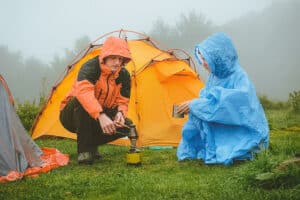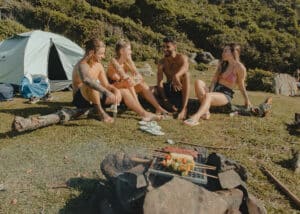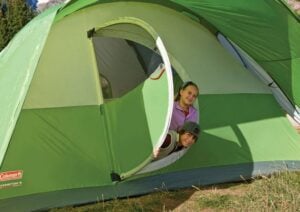Buying a tent is a big decision. There are so many factors to consider: the type of tent, the size, the features, the price. How do you know which one is right for you?
You might be nervous about making a bad purchase. Maybe your last tent fell apart after only one use, or maybe it was too small for your family’s outing.
Whatever the reason, you want to make sure that your next tent is the right one. The good news is there are lots of options out there, so you have no shortage of places to buy a tent.
To help you out, we’ve put together this post about the 11 most important things to consider when you’re out shopping for your next tent. We also included tips on how to find the right tent and what features are must-haves for your specific use. Take a look, and you’ll be an expert on tents in no time!
What should I look for when buying a tent?
Choosing the right one can be tough, so it’s important that you consider all of your options. An important tip to remember is that quality usually comes at a price, so you might have to spend more money on a higher-quality tent if you want something that lasts.
When you buy a tent, you should consider the following factors: the type of tent, the size, the features, and the price. Think about how you will be using the tent and what kind of weather conditions you might encounter.
11 factors to consider when you buy a tent
Camping tents are designed to offer the camper a safe place to getaway. It is important for any potential tent buyer to consider all of the factors before making their purchase.
1. The type of camping trip you plan to go on
Think about the type of camping you will be doing before making your purchase. Will you be backpacking or car camping? Many tents can meet the needs of both activities, but it’s important to consider what will work best for your typical trip. Keep reading to learn about the different types of camping trips.
2. Your camping group: Consider how many people you will be accommodating
Tents come in a variety of sizes and you will need to consider the size your group actually needs. Tents typically range from one person to two people up to even fourteen. It’s important to consider who will be sleeping in the tent as it might not be suitable for all members of your party.
3. Tent Prices: Weigh your budget against the features you want
Consider your budget when you start shopping. The price of a tent can vary depending on the type of tent, tent sizes, and tent features. There are bargain tents available that will meet most people’s needs, but be sure to watch out for cheap products that might not last very long. Most tents range in price from just $25 up to $350 or more.
4. Weather: Check the weather conditions where you will be using the tent
It is important to know what kind of weather you’ll be camping in. This will help you pick the best tent for your needs. If you camp in extreme weather, such as high winds or lots of rain, it can be helpful to purchase a sturdier model with quality construction and design for those harsher weather conditions.
5. Ease of Assembly: See if it is easy to set up and takedown
You want a tent that is easy to set up and takedown. Be sure you can handle setting it up by yourself without too much trouble. Tent poles play a huge part in the tent’s ease of assembly. For instance, fiberglass poles are easier to snap into place than aluminum tent poles. It’s important to think about whether you’ll be camping by yourself or if someone can help with set up and takedown.
6. Storage Space: Think about how much storage space you need
Many smaller tents now come with storage options included, but it’s important to think about how much storage you will actually need. Do you have backpacking gear or bulky camping supplies? If so, you might want to purchase a tent with pockets or storage options to store your equipment. Some tents are now available with gear lofts for upper storage and others include vestibules that can provide additional covered space outside of the tent. Ask yourself whether you need the ability to separate your sleeping area from your gear storage.
7. Tent Materials: Choose a quality tent that is durable and reliable
It is important to think about the tent materials when you are making your purchase. Most tents are now available in a variety of materials, including nylon or cotton canvas, polyester or polyurethane, and silicone-coated fabrics.
Does the tent come with a tent floor? Tent floors vary in durability depending on the material used. In most cases, a quality tent floor made from a thicker material will provide more protection against springy ground and sharp objects.

9. Harsh Environments: Consider the climate and environment where you will be using it
If you plan on using your tent in extreme environments, it’s important to consider the type of construction. Look for a sturdier design with high-quality materials that are meant to stand up to tough conditions.
f you’re planning to take your tent into winter weather conditions, consider purchasing a tent that is both waterproof and windproof for the ultimate in harsh weather protection. If the tent you’re looking at, isn’t already waterproof, be sure to bookmark article on how to waterproof your tent.
Read more about how you can protect yourself against the cold and stay warm in your tent when winter camping.
10. Add-Ons: Don’t forget about the extra features you might want
Tents often come with a number of extra features and add-ons that can help you stay organized, comfortable, and safe. For example, look for tents that have built-in pockets or gear lofts for easy storage and organization. It’s also helpful to think about lighting options like power ports and powerful LED lights if you plan on camping in low-light conditions.
11. Other Uses: Think about how you might use the tent other than camping
Tents are not only used for camping purposes. Many people enjoy using their tents in the backyard or in other recreational situations, so consider whether you might use your tent for activities like an outdoor movie night or impromptu shelter from the rain.
How to find the right tent for your needs
The type of camper you are will determine the type of tent you buy.
For example, if you’re a car camper, storage space and ease of transportation will likely be more important to you than size. So if you plan to do a lot of car camping, it might make sense to buy an instant tent that pops up in one step.
On the other hand, if you love camping in a small group and you value comfort as well as ease of assembly, an instant tent might not be your best choice.
How to choose a Family Camping Tent?
When choosing a family camping tent, consider what you will be using the tent for. If it’s only occasional use, fishing trips, or weekend getaways with friends, you likely want something affordable that sets up easily but won’t last forever.
Depending on the size of your family, you might want to look into a cabin tent with multiple rooms and separate spaces for sleeping and storage. Weather-resistant dome tents are usually one of the best options if your family plans to camp in all kinds of weather conditions.
How to choose a Backpacking Tent?
If you’re interested in backpacking or hiking into your camping site, you’ll want to look into lightweight backpacking tents. They’re usually very easy to carry. Ultralight tents are the best option for backpackers because they’re extremely lightweight and compact when packed down. These tents typically have just one room so they don’t take up much space in your pack, but offer the best protection from the elements.
How do you pick a Winter Camping tent?
Camping in the winter is a whole different game than ordinary camping. If you plan to take your tent into the snow, it’s important to find one with excellent ventilation and breathability.
It also helps if your winter tent has poles made from strong, cold-resistant material like aluminum or carbon fiber. One of the best options for cold weather conditions is a double-walled tent, which features a separate interior protective layer. This construction traps heat and minimizes condensation so you stay warmer inside the tent. Have a stove jack? Check out our top picks for tents with stovejacks for winter camping.
How do you choose a Camping Tent for Your Car?
If you plan to do a lot of car camping, size and ease of transportation are the most important things to consider. If you buy an instant tent that pops up in one step, you won’t have any trouble making camp in just a few minutes. Instant tents are usually the most affordable option, too. Keep in mind that if you plan to drive very far or off-road at all with your car camping tent, it might be best to opt for a vehicle-specific model.

What kind of tents are used in the Desert?
Desert camping is an experience everyone should have at least once in their lifetime. There are a few things to consider when selecting a tent for desert camping, however. If you’re going to be doing any hiking or traveling by foot, look for a lightweight backpacking style tent with a fly and minimal poles so it doesn’t take up too much space in your bag. If you plan to do a lot of car camping, consider buying an instant tent that lets you set up camp quickly and easily.
How do I choose a beach tent?
Choosing the right tent for your beach vacation is all about keeping cool. If you’re looking to just get out of the sun for a while, try selecting a canopy-style model with an open roof so hot air can escape freely. But, if you plan to spend the day in your beach tent reading or napping, look for one with a screen and bug mesh so you don’t get eaten alive by pesky bugs.
Looking for a sturdy folding wagon that can carry all your family’s stuff from the car to the perfect beach spot?
How do I choose a Tent for Two?
A two-person tent is ideal for couples or smaller families who only plan to go camping occasionally, but still want the comforts of home. When choosing a two-person tent look for one that’s just big enough to fit you both comfortably. A good width for most two-person tents is around 54 inches, but some can be as narrow as 42 inches.
What are the Best Tents For Kids?
When buying a tent for kids, it’s important to select one that’s big enough so they have plenty of space to move around, but small enough so they can easily carry or transport it. Opt for a larger tent that can easily fit their sleeping bags and provide enough space to play around in. Parents should also look for freestanding models with mesh roofs, which allow plenty of airflows.
Frequently Asked Questions when choosing a tent
What are the different types of tents?
The different types of tents include backpacking tents, dome tents, cabin tents, family tents, and teepee tents.
Do I need a tent footprint, rainfly, or a ground cloth?
A tent footprint is a layer of material that goes underneath the actual tent. A ground cloth is used to protect the bottom of your tent from rocks and moisture. Many tents come with these items included, but make sure to check before purchasing them separately.
What are some good tips for camping in cold conditions?
If you are camping in very cold climates, make sure to bring extra blankets and layers. You should also keep an eye on the weather forecast so you can prepare accordingly for snow or freezing temperatures.
When should I buy a car camping tent?
If you like to camp on established campsites, but don’t want to compromise comfort, consider investing in a car camping tent. These tents are usually larger and offer more features than traditional backpacking tents. They also tend to be heavier and harder to transport.
What is the difference between free-standing tents vs. non-free-standing tents?
Non-free standing tents usually require the use of a separate frame, poles and stakes. Free-standing tents can stand on their own without these extra accessories. We recommend free-standing tents for people who want to save time setting up camp and prefer not having to mess around with extra pieces.
Why is ventilation important for summer tents?
In the summer, ventilation is especially important in a tent because it helps to keep you from getting too hot when sleeping. Look for tents with mesh roofs and detachable rainflies if possible.
Where can I find a freestanding tent?
Freestanding tents are usually the easiest to set up. They don’t require a separate frame or poles, which makes them great for camping off of established campsites where there are no trees to use as support. Most backpacking-friendly tents are also free standing versions.
So how do I pick the perfect tent for my needs?
The short answer is, it depends! There are so many factors to consider when buying a tent. It’s important to know what type of camping you plan to do, how much it will cost, and how long you’ll need the tent for. We highly recommend you read our article on the different types of tents so you can figure out what type of tent is best for you.
Recap and Further Reading
When buying a tent for camping, it’s important to consider the climate and conditions you will be camping in. Look for tents with features that are specific to your needs like good ventilation for winter or a fly for backpacking tents.
We’ve talked about a lot of different tents in this article, and you may be wondering what they all have in common. They are all great options for anyone who want to find the right tent that suits their needs best – whether it’s an instant tent for car campers or a backpacking style model with its own carrying case. We hope you found this article helpful in your search for the perfect tent!
Continue reading and learn more about the different types of tents. There, we discuss the different tent styles and offer our top picks for the best camping tents on the market!





